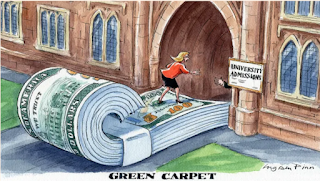Blog #7: Theoretical Frame
Meritocracy in Higher Education
Meritocracy is a social system where advancement in society is based on one’s abilities and merits rather than on the basis of family, wealth, or social background. It has allowed people from low status groups to dream of improving their social status, economic class, and place in the social hierarchy. The impression is that everyone, no matter what their background is, can succeed if they develop the necessary merits. People want to believe they live in a ‘fair’ society where hard work can achieve anything regardless of their social position at birth. However, in reality, higher education has become a powerful means for reproducing class and privilege. College, has stopped to function as an engine of social mobility…
Joseph F. Kett, James Madison Professor of History at the University of Virginia, argues that there are at least two strikingly different ways in which merit has been understood in American history.
- “Essential Merit”: merit that rests on specific and visible individual achievements that in turn reflect an estimable character, quite apart from the individual’s social rank.
- “Institutional Merit”: this form of merit is not concerned with “essential character” but with the acquisition of specialized knowledge—knowledge that could be taught in schools, tested in written examinations, and certified by expert-staffed credentialing bodies.
Works Cited
McClay, Wilfred M. “Higher Ed’s Dysfunctional Devotion to Meritocracy.” Chronicle of Higher Education, vol. 64, no. 15, 8 Dec. 2017, p. 8. EBSCOhost, search.ebscohost.com/login.aspx?direct=true&db=aph&AN=127245496&site=ehost-live.

Comments
Post a Comment